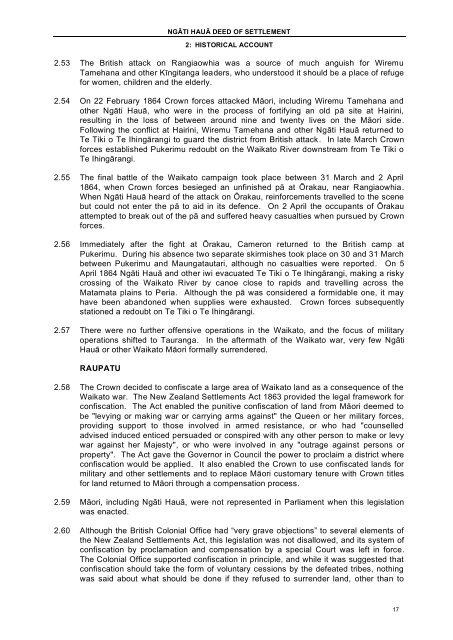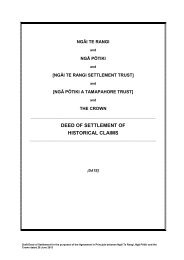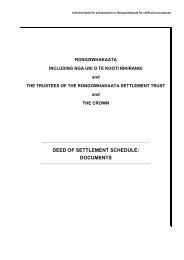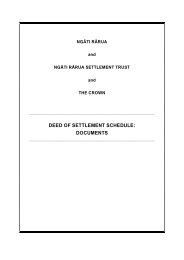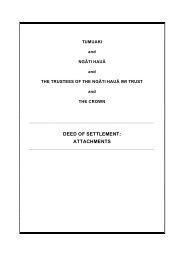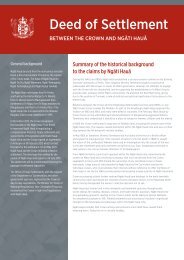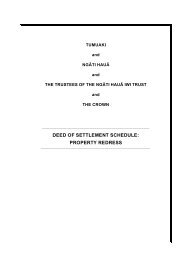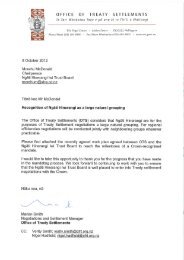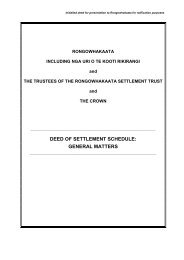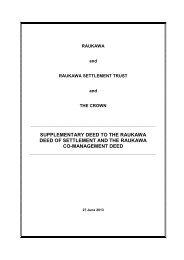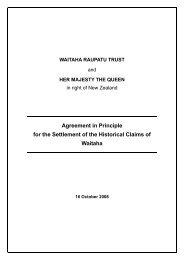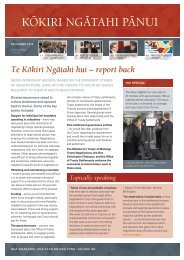Ngati Haua Deed of Settlement - Terabyte Interactive
Ngati Haua Deed of Settlement - Terabyte Interactive
Ngati Haua Deed of Settlement - Terabyte Interactive
Create successful ePaper yourself
Turn your PDF publications into a flip-book with our unique Google optimized e-Paper software.
NGĀTI HAUĀ DEED OF SETTLEMENT2: HISTORICAL ACCOUNT2.53 The British attack on Rangiaowhia was a source <strong>of</strong> much anguish for WiremuTamehana and other Kīngitanga leaders, who understood it should be a place <strong>of</strong> refugefor women, children and the elderly.2.54 On 22 February 1864 Crown forces attacked Māori, including Wiremu Tamehana andother Ngāti Hauā, who were in the process <strong>of</strong> fortifying an old pā site at Hairini,resulting in the loss <strong>of</strong> between around nine and twenty lives on the Māori side.Following the conflict at Hairini, Wiremu Tamehana and other Ngāti Hauā returned toTe Tiki o Te Ihingārangi to guard the district from British attack. In late March Crownforces established Pukerimu redoubt on the Waikato River downstream from Te Tiki oTe Ihingārangi.2.55 The final battle <strong>of</strong> the Waikato campaign took place between 31 March and 2 April1864, when Crown forces besieged an unfinished pā at Ōrakau, near Rangiaowhia.When Ngāti Hauā heard <strong>of</strong> the attack on Ōrakau, reinforcements travelled to the scenebut could not enter the pā to aid in its defence. On 2 April the occupants <strong>of</strong> Ōrakauattempted to break out <strong>of</strong> the pā and suffered heavy casualties when pursued by Crownforces.2.56 Immediately after the fight at Ōrakau, Cameron returned to the British camp atPukerimu. During his absence two separate skirmishes took place on 30 and 31 Marchbetween Pukerimu and Maungatautari, although no casualties were reported. On 5April 1864 Ngāti Hauā and other iwi evacuated Te Tiki o Te Ihingārangi, making a riskycrossing <strong>of</strong> the Waikato River by canoe close to rapids and travelling across theMatamata plains to Peria. Although the pā was considered a formidable one, it mayhave been abandoned when supplies were exhausted. Crown forces subsequentlystationed a redoubt on Te Tiki o Te Ihingārangi.2.57 There were no further <strong>of</strong>fensive operations in the Waikato, and the focus <strong>of</strong> militaryoperations shifted to Tauranga. In the aftermath <strong>of</strong> the Waikato war, very few NgātiHauā or other Waikato Māori formally surrendered.RAUPATU2.58 The Crown decided to confiscate a large area <strong>of</strong> Waikato land as a consequence <strong>of</strong> theWaikato war. The New Zealand <strong>Settlement</strong>s Act 1863 provided the legal framework forconfiscation. The Act enabled the punitive confiscation <strong>of</strong> land from Māori deemed tobe "levying or making war or carrying arms against" the Queen or her military forces,providing support to those involved in armed resistance, or who had "counselledadvised induced enticed persuaded or conspired with any other person to make or levywar against her Majesty", or who were involved in any "outrage against persons orproperty". The Act gave the Governor in Council the power to proclaim a district whereconfiscation would be applied. It also enabled the Crown to use confiscated lands formilitary and other settlements and to replace Māori customary tenure with Crown titlesfor land returned to Māori through a compensation process.2.59 Māori, including Ngāti Hauā, were not represented in Parliament when this legislationwas enacted.2.60 Although the British Colonial Office had “very grave objections” to several elements <strong>of</strong>the New Zealand <strong>Settlement</strong>s Act, this legislation was not disallowed, and its system <strong>of</strong>confiscation by proclamation and compensation by a special Court was left in force.The Colonial Office supported confiscation in principle, and while it was suggested thatconfiscation should take the form <strong>of</strong> voluntary cessions by the defeated tribes, nothingwas said about what should be done if they refused to surrender land, other than to17


